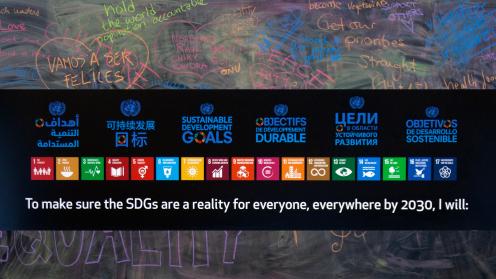HLPF 2022 delegates considered progress, or lack thereof, on SDG 4 (Quality Education), as well as local-level action on the Sustainable Development Goals (SDGs) and equitable access to vaccines and resources for Africa, least developed countries (LDCs) and landlocked developing countries (LLDCs) during the second day of the eight-day event.
To dive deeper, read the full Earth Negotiations Bulletin daily report.
On SDG 4 and its interlinkages with other SDGs, speakers highlighted that the discussion would feed into the Transforming Education Summit taking place in September 2022. Noting significant discrepancies in economic development, technology access, and national planning priorities between different countries, Leonardo Garnier, the UN Secretary-General’s Special Adviser for the Summit, emphasized that we need to ignite a movement to transform education into a true human right for all.
Among the examples and recommendations presented during this discussion, Joy-Marie King, Antigua and Barbuda, reported on her country’s provision of school meals, uniforms, behavior management programmes and psychosocial support. Stefania Giannini, Assistant Director-General for Education, UN Educational, Scientific and Cultural Organization (UNESCO), stressed the need to reopen schools, renew the world’s commitment to education, and invest in education recovery and resilience. Omar Abdi, Deputy Executive Director for Programmes, UN Children's Fund (UNICEF), emphasized the need to: reach every child and keep them in school; scale up learning assessments at national and regional level; and support children’s physical and emotional well-being.
Additional recommendations included: ensure decent working conditions, labor rights, and proper pay for teachers; combat corruption to fund education; view education as an investment rather than expenditure; provide free school meals as a driver for equality; bridge the digital divide and harness the potential of e-learning; lower the cost of higher education; and better equip youth entering the job market.
During a discussion on local-level action to implement the SDGs, speakers highlighted the value of Voluntary Local Reviews (VLRs) as a monitoring and management tool that can be used to signal commitment to both global and regional cooperation on the SDGs.
Speakers also discussed challenges in providing low-income housing and the value of partnerships and a conditional grant scheme to address education, health, and water management, among others.
Recommended actions to ensure equal access to vaccines and resources in the poorest countries included ensuring adequate financing, access to technology and comprehensive capacity for LDCs, LLDCs and Africa. Examples of projects and programmes that could support these countries included a review of the UN Capital Development Fund’s bridge facility, which provides LDCs with loan access, its de-risking facility, and its pathway to capital markets.
Partnerships for vaccine production in Africa were highlighted as a way to expand vaccine access on that continent. Khumbize Kandodo Chiponda, Minister of Health, Malawi, welcomed new contracts for vaccine factories to be built in Senegal and Rwanda, and emphasized the need to take stock of how the Doha Programme of Action for the LDCs for the Decade 2022-2031 is responding to LDCs’ needs in the face of multiple new crises. Several speakers also underscored development as a human right and said the “vaccine nationalism” of many developed countries contravenes the legal duty of international cooperation.
Speakers also highlighted the need for stronger legal frameworks and financial commitments to prevent violence towards women and girls and enable them to enjoy their rights to healthcare and education.
By the end of the day, participants learned that the silence had been broken for the draft Ministerial Declaration, which means negotiations will continue behind the scenes.
All ENB photos are free to use with attribution. For HLPF 2022, please use: Photo by IISD/ENB | Kiara Worth.
To receive free coverage of global environmental events delivered to your inbox, subscribe to the ENB Update newsletter.
SDG 4 and Interlinkages with Other SDGs - Quality Education

Joy-Marie King, Director of International Trade, Ministry of Foreign Affairs, International Trade and Immigration, Antigua and Barbuda

Stefania Giannini, Assistant Director-General for Education, UN Educational, Scientific and Cultural Organization (UNESCO)

Doris Mwikali, SDG 4 Youth Network representative to the SDG 4 Education 2030 High-level Steering Committee (HLSC) Sherpa Group




















































